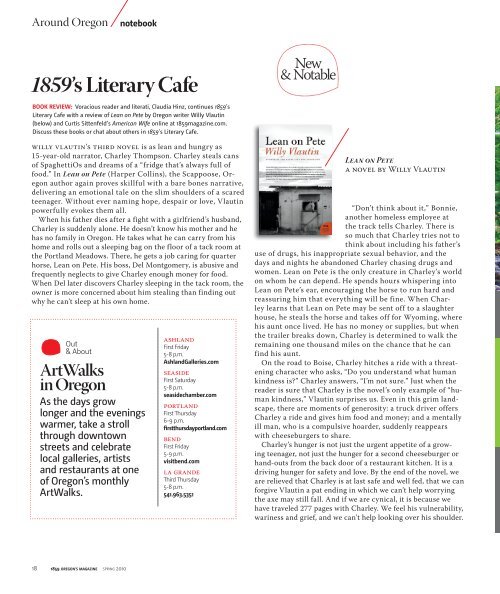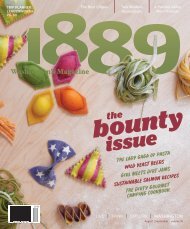1859 Spring 2010
1859 Spring 2010
1859 Spring 2010
Create successful ePaper yourself
Turn your PDF publications into a flip-book with our unique Google optimized e-Paper software.
Around Oregon<br />
notebook<br />
<strong>1859</strong>’s Literary Cafe<br />
BOOK REVIEW: Voracious reader and literati, Claudia Hinz, continues <strong>1859</strong>’s<br />
Literary Cafe with a review of Lean on Pete by Oregon writer Willy Vlautin<br />
(below) and Curtis Sittenfeld’s American Wife online at <strong>1859</strong>magazine.com.<br />
Discuss these books or chat about others in <strong>1859</strong>’s Literary Cafe.<br />
WILLY VLAUTIN’S THIRD NOVEL is as lean and hungry as<br />
15-year-old narrator, Charley Thompson. Charley steals cans<br />
of SpaghettiOs and dreams of a “fridge that’s always full of<br />
food.” In Lean on Pete (Harper Collins), the Scappoose, Oregon<br />
author again proves skillful with a bare bones narrative,<br />
delivering an emotional tale on the slim shoulders of a scared<br />
teenager. Without ever naming hope, despair or love, Vlautin<br />
powerfully evokes them all.<br />
When his father dies after a fight with a girlfriend’s husband,<br />
Charley is suddenly alone. He doesn’t know his mother and he<br />
has no family in Oregon. He takes what he can carry from his<br />
home and rolls out a sleeping bag on the floor of a tack room at<br />
the Portland Meadows. There, he gets a job caring for quarter<br />
horse, Lean on Pete. His boss, Del Montgomery, is abusive and<br />
frequently neglects to give Charley enough money for food.<br />
When Del later discovers Charley sleeping in the tack room, the<br />
owner is more concerned about him stealing than finding out<br />
why he can’t sleep at his own home.<br />
Out<br />
& About<br />
ArtWalks<br />
in Oregon<br />
As the days grow<br />
longer and the evenings<br />
warmer, take a stroll<br />
through downtown<br />
streets and celebrate<br />
local galleries, artists<br />
and restaurants at one<br />
of Oregon’s monthly<br />
ArtWalks.<br />
ASHLAND<br />
First Friday<br />
5-8 p.m.<br />
AshlandGalleries.com<br />
SEASIDE<br />
First Saturday<br />
5-8 p.m.<br />
seasidechamber.com<br />
PORTLAND<br />
First Thursday<br />
6-9 p.m.<br />
firstthursdayportland.com<br />
BEND<br />
First Friday<br />
5-9 p.m.<br />
visitbend.com<br />
LA GRANDE<br />
Third Thursday<br />
5-8 p.m.<br />
541.963.5351<br />
New<br />
& Notable<br />
LEAN ON PETE<br />
A NOVEL BY WILLY VLAUTIN<br />
“Don’t think about it,” Bonnie,<br />
another homeless employee at<br />
the track tells Charley. There is<br />
so much that Charley tries not to<br />
think about including his father’s<br />
use of drugs, his inappropriate sexual behavior, and the<br />
days and nights he abandoned Charley chasing drugs and<br />
women. Lean on Pete is the only creature in Charley’s world<br />
on whom he can depend. He spends hours whispering into<br />
Lean on Pete’s ear, encouraging the horse to run hard and<br />
reassuring him that everything will be fine. When Charley<br />
learns that Lean on Pete may be sent off to a slaughter<br />
house, he steals the horse and takes off for Wyoming, where<br />
his aunt once lived. He has no money or supplies, but when<br />
the trailer breaks down, Charley is determined to walk the<br />
remaining one thousand miles on the chance that he can<br />
find his aunt.<br />
On the road to Boise, Charley hitches a ride with a threatening<br />
character who asks, “Do you understand what human<br />
kindness is?” Charley answers, “I’m not sure.” Just when the<br />
reader is sure that Charley is the novel’s only example of “human<br />
kindness,” Vlautin surprises us. Even in this grim landscape,<br />
there are moments of generosity: a truck driver offers<br />
Charley a ride and gives him food and money; and a mentally<br />
ill man, who is a compulsive hoarder, suddenly reappears<br />
with cheeseburgers to share.<br />
Charley’s hunger is not just the urgent appetite of a growing<br />
teenager, not just the hunger for a second cheeseburger or<br />
hand-outs from the back door of a restaurant kitchen. It is a<br />
driving hunger for safety and love. By the end of the novel, we<br />
are relieved that Charley is at last safe and well fed, that we can<br />
forgive Vlautin a pat ending in which we can’t help worrying<br />
the axe may still fall. And if we are cynical, it is because we<br />
have traveled 277 pages with Charley. We feel his vulnerability,<br />
wariness and grief, and we can’t help looking over his shoulder.<br />
18 <strong>1859</strong> OREGON'S MAGAZINE SPRING <strong>2010</strong>

















